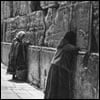Moses Sends Scouts to Canaan
While the children of Israel were camping in the desert near Kadesh-Barnea, and the land of Canaan was not far away, they demanded that Moses send a group of scouts to spy out the country, so that they might be informed of its strength and weaknesses.
G‑d told Moses to fulfill the people's request, whereupon, Moses selected twelve eminent men, each one a leader of his tribe, and sent them on this mission. Among them were Joshua of the tribe of Ephraim, and Caleb, Miriam's husband, of the tribe of Judah. Before they left, Moses told them (Numbers 13:17): "Go up this way in the south and climb up the mountain. You shall see what [kind of] land it is, and the people who inhabit it; are they strong or weak? Are there few or many? And what of the land they inhabit? Is it good or bad? And what of the cities in which they reside are they in camps or in fortresses? What is the soil like is it fat or lean? Are there any trees in it or not? You shall be courageous and take from the fruit of the land."
The twelve men left on their mission to spy out the land of Canaan. They crossed the entire southern part of the country till they reached Hebron, the dwelling place of giants. While in Hebron, Caleb went to the Cave of Machpelah to pray to G‑d.
The scouts had become so impressed and overawed by the size and strength of the inhabitants of the land, that they decided the land was unconquerable. Only Caleb and Joshua did not lose their faith in G‑d, and knew that He would keep His promise. The spies took back with them some of the choicest fruits of the country, such as figs, pomegranates, and grapes which were so heavy that eight men had to carry one cluster of grapes on two poles.
Return the Spies
After an absence of forty days, the twelve scouts returned to the camp at Kodesh with magnificent specimens of Canaan's produce. But the account they gave was not altogether cheering. A beautiful country, truly, said the spies, and a land that flowed with milk and honey, but a country with strong cities inhabited by formidable men, among whom was the fierce race of giants, the terrible sons of Anak. Not a province but what was occupied by warlike tribes, the Amalekites in the South, the Hittites, the Jebusites, and the Amorites in the mountain passes, and the Canaanites in the plains and on the banks of the Jordan.
The people's hearts sank within them; they felt unable to encounter such powerful foes; but Caleb, wishing to inspire them with hope and fortitude, exclaimed: "We can surely go up and take possession of it, for we can indeed overcome it." Alas! His cowardly companions would not hear of encouragement; they began to exaggerate the danger (Numbers 13:32-33): "The land we passed through to explore is a land that consumes its inhabitants, and all the people we saw in it are men of stature. There we saw the giants, the sons of Anak, descended from the giants. In our eyes, we seemed like grasshoppers, and so we were in their eyes." They upbraided Moses and Aaron and proposed in their blind folly to choose a captain who might lead them back to Egypt. At night (it was the night of Tisha B'Av) the people wept in their tents, voicing their bitter complaint against Moses and Aaron for leading them into such a predicament. Now they were stuck in the desert, a prey to thirst, hunger, and wild animals. They would do better to return to the slavery of Egypt than die here.
In vain did Joshua and Caleb try to allay the excitement and despondency of the people. They pointed to the excellence of the land, and to G‑d's promise, which was a better guarantee than all military power and strategy. But the people were in a mood of defiance and revolt. They would have stoned Joshua and Caleb, had G‑d not saved them from their hands, by causing His cloud of glory to appear over the Sanctuary.
Penalty for the Revolt
Then G‑d declared to Moses that, as a punishment for their disbelief, the people should be smitten with pestilence and die; from Moses alone should descend a great and mighty nation, bearing G‑d's name and spreading His truth. But Moses entreated G‑d to forgive them. And the L-rd said: ""I have forgiven them in accordance with your word. However, as surely as I live, and as the glory of the L-rd fills the earth... that all the people who perceived My glory, and the signs that I performed in Egypt and in the desert, yet they have tested me these ten times and not listened to My voice, if they will see the Land that I swore to their fathers, and all who provoked Me will not see it. But as for My servant Caleb, since he was possessed by another spirit, and he followed Me, I will bring him to the land to which he came, and his descendants will drive it[s inhabitants] out. this desert, your corpses shall fall; your entire number, all those from the age of twenty and up, who were counted, because you complained against Me. "
For forty years, G‑d continued, the Hebrews would lead a wandering life in the desert, one year for each day spent by the spies in their journey of exploration; to their children was to be reserved the conquest of the land which they themselves dreaded so much; and of all their vast hosts, Joshua and Caleb alone, the brave-hearted and loyal followers of Moses, were to be permitted to enter the Land of Promise.
The Rebels' Second Disobedience
Then, all the scouts, except Joshua and Caleb, died a sudden death.
When Moses brought these words of G‑d to the children of Israel, they mourned deeply. Finally, in their despair, they decided to make good their sin by an immediate attack against the land of Canaan. Moses begged them not to do anything without G‑d's orders. He warned them of certain defeat, but they persisted in their plan and marched out of camp. As Moses had predicted, the rebellious troops of the children of Israel were vanquished by the armies of the Amalekites and Canaanites. Those who escaped the sword returned disheartened and repenting.
Punishment for the Desecration of Shabbat
Once, while the children of Israel were camping in the desert, a man by the name of Zelophehad, committed an act of public desecration, of the Shabbat by gathering wood in front of everyone on the Shabbat day. He was brought before Moses and put in temporary custody, till G‑d should pronounce his penalty.
By Divine judgment he was ordered to be led outside of the camp, and to be publicly stoned, in atonement for his great sin. Although Zelophehad died the death of a sinner, he called the attention of all of Israel to the holiness of the Shabbat and to the consequences of its desecration.
Punishment for Blasphemy
Among the children of Israel lived a man whose father was an Egyptian and whose mother was a Jewess. Once he got into an argument, and in his lack of reverence for G‑d, blasphemed the Divine Name. He, too, was brought before Moses and put under guard till G‑d should pronounce his punishment. Again G‑d told Moses that the blasphemer was to be brought outside the camp and stoned in front of the entire community, as a solemn warning to all.








Join the Discussion